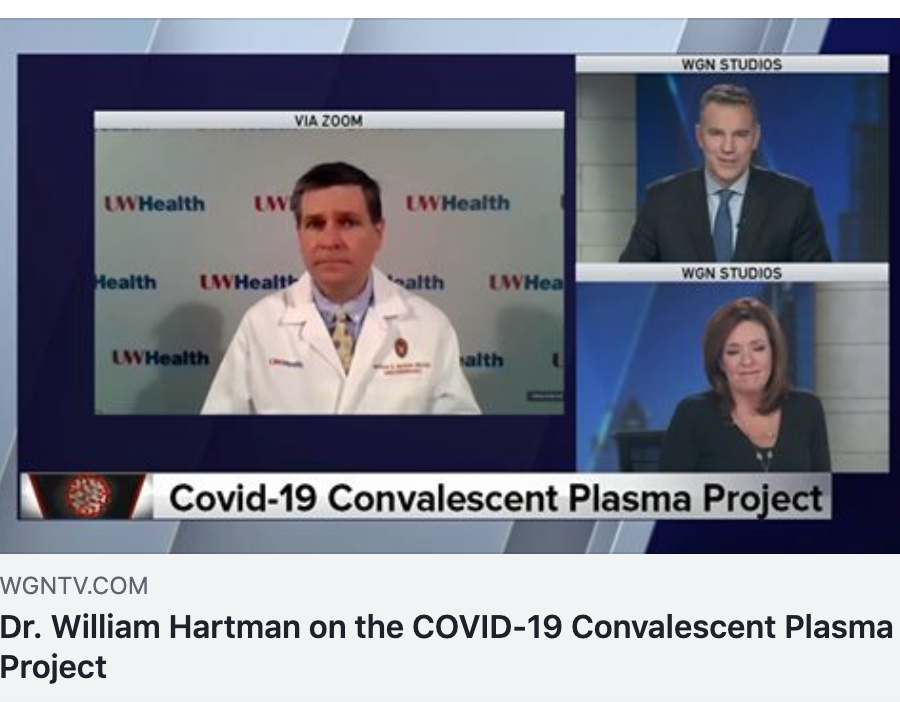
Last week the University of Wisconsin-Madison announced it was beginning to treat patients very sick with Covid-19 by transfusing them with the plasma from people who had recovered from it. My brother, Dr. Bill Hartman, is leading this study in Madison. I asked Bill if he wouldn’t mind doing a follow-up interview with me answering a few more questions. I hope you find this helpful.
Why is the plasma from people who have recovered from Covid-19 being used as a treatment?
Immunity happens in two ways, active or passive. Vaccines cause active immunity and allow us to build up antibody to fight off dangerous diseases. In the absence of a vaccine, as we have here with COVID-19, we attempt to confer passive immunity–or giving sick people the antibody to help fight the disease. The only place this antibody exists is in people who have been infected with the virus. Since their antibody fought off the disease in their bodies, we hope that it can do the same in someone else’s body. This is an older method going back over 100 years used to treat viruses where no vaccine existed. We believe that the plasma from patients who’ve recovered from Covid-19 have adequate amounts of antibody—or super power—and hope that it can help very sick patients needing a boost to beat this disease. We’re very hopeful this will work.
How do I donate plasma?
Register with the Red Cross. There is a special form you need to complete to be deemed eligible to donate plasma for Covid-19 patients. Once you’re selected, you’ll be told where you can go and donate. While the Red Cross (and Vitalant in the Chicago area) is streamlining its process, vetting applications does take some time. Don’t be surprised if you don’t hear back right away.
Can people who think they had Covid-19 but were never tested donate their plasma?
Not yet. Several antibody tests are being evaluated right now, but the national consortium hasn’t yet come to an agreement as to which test is the best one to use. Until sufficient quality control has been done on these tests, we can only use donors who have had a previous positive COVID test.
Is it a big deal to donate plasma?
No. Not at all. It’s very similar to giving blood.
If I’ve had Covid-19 and have recovered, do I need to worry about catching it again?
The evidence on this isn’t clear. The virus isn’t mutating very quickly, so most would agree that the chance of being re-infected is low. There are reports out of South Korea and Wuhan suggesting that reinfection could be possible, though. We’re literally learning new things about the virus daily, so we will have to wait and see what pans out on this topic. I, for one, certainly hope that COVID-19 is a one-and-done thing. The effect this has had on the world, on our country, and in our smaller communities has just been devastating.
How important is wearing a mask?
I wear a mask when I go out to the grocery store. It doesn’t hurt and it probably will only help. The masks that people are wearing mostly keep the germs that you have from getting to someone else. It’s just one more easy thing you can do to help keep your neighbors healthy. The most important thing you can do to keep yourself healthy is to consistently wash your hands and avoid touching your face. When I care for a patient with COVID-19, I wear very different equipment depending on how I am interacting with the patient. This equipment, including the N95 masks, takes special training to figure out how to use them properly. I see a lot of people wearing and handling their N95s incorrectly, and thus they offer little resistance to the virus.
Where do you think we are on the curve?
I think the United States as more of a series of curves. Big cities where many people live vertically and very close together have a different curve than smaller cities like Madison where people are more spread out. In Wisconsin, the curve is pretty flat and I feel we can see a light at the end of the tunnel. People have to realize, though, that flattening the curve is intended to avoid surges and to prevent using up medical supplies in short order. People will still get sick and the virus will still be around, it’s just that fewer people will get sick from the virus at one any one time. It’s very important for people to understand that flattening the curve doesn’t mean that the virus has gone away.
How long do you think it will be before we can get back to normal?
I’m not sure that we will ever get back to normal. I feel there will just be a new normal. I see a light at the end of the tunnel, but we would make a huge mistake by opening up the economy all at once and doing it too soon. Doing things in stages, doing things slowly and methodically will be key. That way if a spike in cases does happen, we can quickly close down that particular sector again.
What can we do while we’re sheltering in place to help with your efforts?
Continue to use social distancing and washing your hands a lot is a huge help. If you know anyone who has recovered from COVID, ask them to be a donor. With this disease, the community is truly saving the community. Mostly, say a prayer for providers–nurses, technicians, therapists, cleaning crews, and doctors–here on the front lines. They know what they are up against yet they go into work anyway. These are the toughest of times, but we continue to see the best of people.
A little bit more about Dr. Bill Hartman: A Ph.D and M.D., Dr. Hartman is an anesthesiologist at UW Health and an assistant professor at the University of Wisconsin School of Medicine and Public Health. He is the Medical Director for the UW Health Preanesthesia Assessment Clinic. Prior to joining the staff at UW Health, he was at Kaiser Permanente in Denver, Colorado and Mayo Clinic in Rochester, Minnesota. When he’s not saving lives, he and his wife Ann can be found in a hockey rink cheering on any one of their five children.




Thank you for this❤️
Awe. I hope it was helpful and hopeful. xo
This is so helpful and informative, and from a trusted source! Thank you!
Great information. Thank you for the additional education.